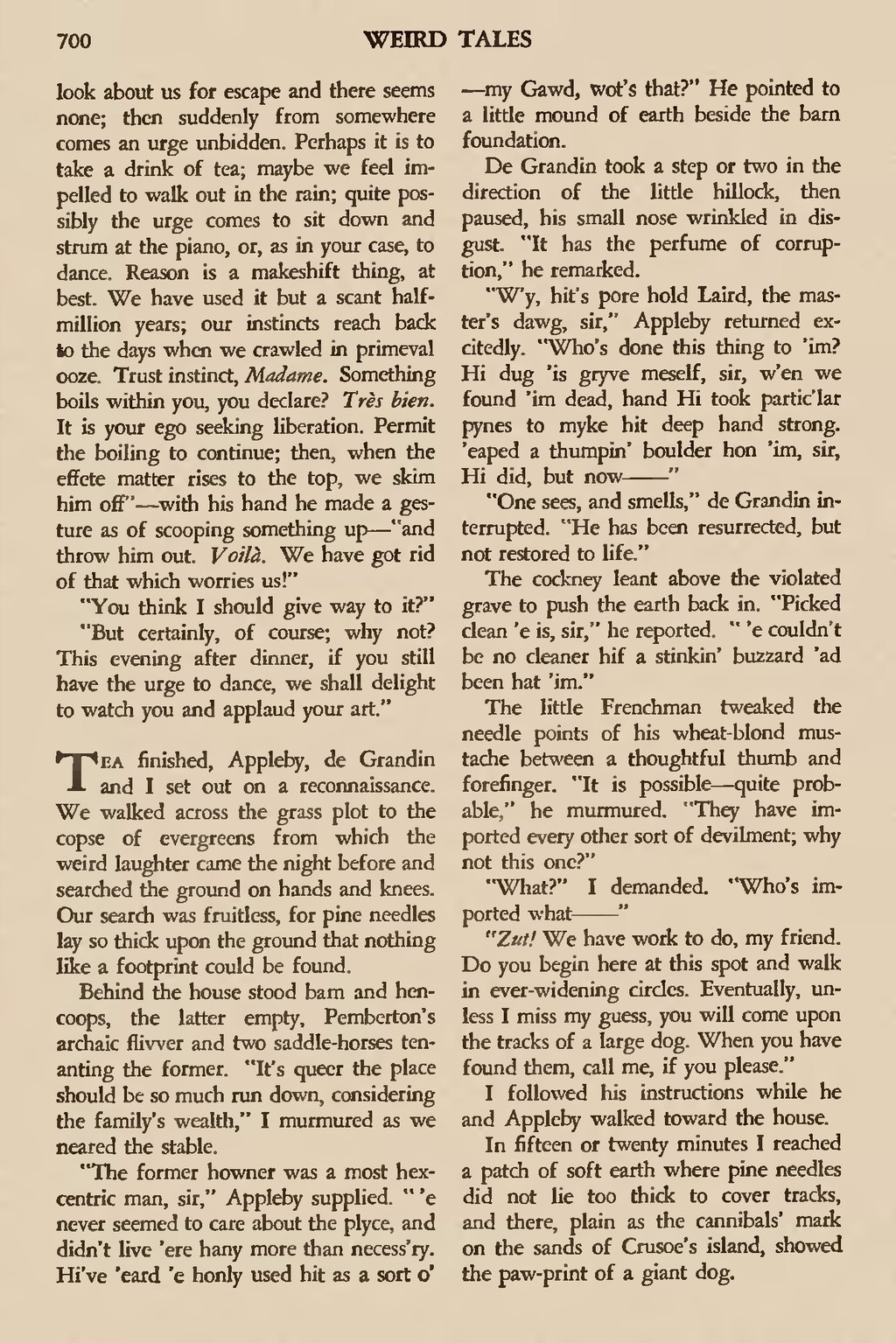look about us for escape and there seems none; then suddenly from somewhere comes an urge unbidden. Perhaps it is to take a drink of tea; maybe we feel impelled to walk out in the rain; quite possibly the urge comes to sit down and strum at the piano, or, as in your case, to dance. Reason is a makeshift thing, at best. We have used it but a scant half-million years; our instincts reach back to the days when we crawled in primeval ooze. Trust instinct, Madame. Something boils within you, you declare? Très bien. It is your ego seeking liberation. Permit the boiling to continue; then, when the effete matter rises to the top, we skim him off"—with his hand he made a gesture as of scooping something up—"and throw him out. Voilà. We have got rid of that which worries us!"
"You think I should give way to it?"
"But certainly, of course; why not? This evening after dinner, if you still have the urge to dance, we shall delight to watch you and applaud your art."
Tea finished, Appleby, de Grandin and I set out on a reconnaissance. We walked across the grass plot to the copse of evergreens from which the weird laughter came the night before and searched the ground on hands and knees. Our search was fruitless, for pine needles lay so thick upon the ground that nothing like a footprint could be found.
Behind the house stood barn and hen-coops, the latter empty, Pemberton's archaic flivver and two saddle-horses tenanting the former. "It's queer the place should be so much run down, considering the family's wealth," I murmured as we neared the stable.
"The former howner was a most hexcentric man, sir," Appleby supplied. "'e never seemed to care about the plyce, and didn't live 'ere hany more than necess'ry. Hi've 'eard 'e honly used hit as a sort o'—my Gawd, wot's that?" He pointed to a little mound of earth beside the barn foundation.
De Grandin took a step or two in the direction of the little hillock, then paused, his small nose wrinkled in disgust. "It has the perfume of corruption," he remarked.
"W'y, hit's pore hold Laird, the master's dawg, sir," Appleby returned excitedly. "Who's done this thing to 'im? Hi dug 'is gryve meself, sir, w'en we found 'im dead, hand Hi took partic'lar pynes to myke hit deep hand strong, 'eaped a thumpin' boulder hon 'im, sir, Hi did, but now"
"One sees, and smells," de Grandin interrupted. "He has been resurrected, but not restored to life."
The cockney leant above the violated grave to push the earth back in. "Picked clean 'e is, sir," he reported. "'e couldn't be no cleaner hif a stinkin' buzzard 'ad been hat 'im."
The little Frenchman tweaked the needle points of his wheat-blond mustache between a thoughtful thumb and forefinger. "It is possible—quite probable," he murmured. "They have imported every other sort of devilment; why not this one?"
"What?" I demanded. "Who's imported what"
"Zut! We have work to do, my friend. Do you begin here at this spot and walk in ever-widening circles. Eventually, unless I miss my guess, you will come upon the tracks of a large dog. When you have found them, call me, if you please."
I followed his instructions while he and Appleby walked toward the house. In fifteen or twenty minutes I reached a patch of soft earth where pine needles did not lie too thick to cover tracks, and there, plain as the cannibals' mark on the sands of Crusoe's island, showed the paw-print of a giant dog.
